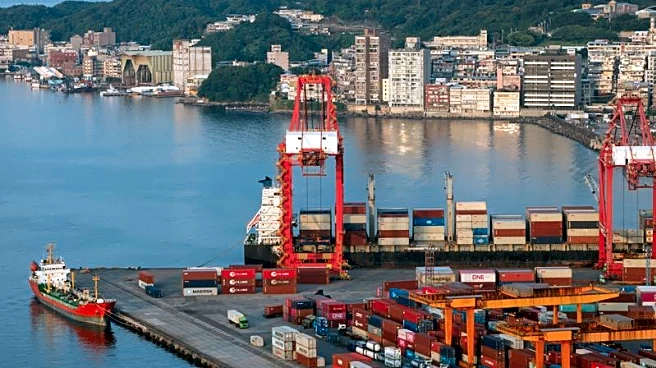Rapid Read • 8 min read
President Trump's tariff program is creating challenges for U.S. ports, according to Cary Davis, President and CEO of the American Association of Port Authorities. The unpredictability of tariffs is complicating planning for freight volumes at maritime borders, which handle a significant amount of cargo compared to land borders. The removal of rules that previously exempted packages below $800 from tariffs is expected to increase the number of taxed items. Additionally, tariffs are affecting the equipment used at ports, such as large cranes, which are primarily sourced from China. A recent legislative proposal, the Port Crane Tax Credit Act, aims to incentivize domestic manufacturing of these cranes, although the transition will take time.
AD
The tariff program has significant implications for the U.S. economy, particularly for trade-dependent sectors. Ports are critical nodes in the supply chain, and disruptions can affect the flow of goods, impacting businesses and consumers. The tariffs could lead to higher costs for imported goods, affecting consumer prices and potentially slowing economic growth. On the other hand, the focus on fairness in trade deals may open new markets for American goods, benefiting exporters. The situation underscores the complexity of balancing trade protectionism with economic expansion.
The ongoing tariff situation may prompt further legislative actions to support domestic manufacturing and mitigate the impact on ports. Stakeholders, including port authorities and businesses, will likely continue to adapt to the changing trade landscape. The effectiveness of new trade deals in reducing non-tariff barriers will be closely monitored, as they could provide opportunities for U.S. exporters. The broader economic impact will depend on how these policies influence trade volumes and consumer prices.
The tariff program raises questions about the long-term strategy for U.S. trade policy and its alignment with global economic trends. Ethical considerations regarding trade fairness and the impact on developing economies may also emerge. The focus on domestic manufacturing could lead to shifts in industrial policy and investment in infrastructure, potentially reshaping the U.S. manufacturing landscape.
AD
More Stories You Might Enjoy












